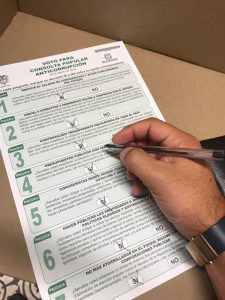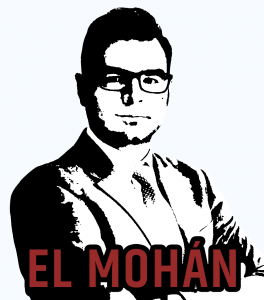
Photo courtesy of @camilovelasco99
On September 19 President Iván Duque introduced, to much fanfare, eight anti-corruption bills to Congress. This development came shortly after the Anti-Corruption Popular Consultation failed to pass the mandatory participation threshold on August 26th and was designed to embrace the will of 11.6 million voters. Duque’s move was politically astute since it effectively made him the leader of the anti-corruption movement. However, many of the projects that the government introduced are today stuck in the legislative process, where brinksmanship and conflicting interests imperil the future of the projects. Congress is incapable of reform, that we knew, but does Duque hold any sway over his party?
 Shortly after the Anti-Corruption Popular Consultation failed to pass the mandatory participation threshold by a slim 469,000 votes, president Duque summoned the main promoters of the consultation, along with the heads of all the congressional caucuses, the presidents of the upper and lower houses of Congress, the Comptroller General, the Public Prosecutor, and the Attorney General to a meeting at the presidential palace.
Shortly after the Anti-Corruption Popular Consultation failed to pass the mandatory participation threshold by a slim 469,000 votes, president Duque summoned the main promoters of the consultation, along with the heads of all the congressional caucuses, the presidents of the upper and lower houses of Congress, the Comptroller General, the Public Prosecutor, and the Attorney General to a meeting at the presidential palace.
The meeting itself was a significant event, because it was the first time the FARC political party was invited to a meeting with President Duque. In addition to this, the urgency of the meeting made apparent that the turnout of the consultation was significantly higher than expected and marked a turning point in Colombian Politics.
The meeting resulted in President Duque announcing that the government would introduce eight anti-corruption bills that would embody the spirit of the consultation, albeit make slight reforms to the points to guarantee their constitutionality and make them acceptable to the majority of the parties in attendance. Duque instructed his Minister of Interior Nancy Patricia Gutierrez to give notice to Congress of the urgent priority for the bills, which should put them at the front of the legislative cue.
And so, Duque had us believe that he had the metaphorical Congressional bull by the horns and would get the job done. Congress, however, had a different idea.
Letter and spirit
Many observers were pleased with the outcome of President Duque’s draft bills. Although they were not a carbon copy of the proposals in the Anti-Corruption Consultation, for the most part they were close enough. Below is an analysis of the compatibility of Duque’s anti-corruption reform and the proposals in the anti-corruption consultation.
| Duque’s Anti-Corruption Reform | Anti-Corruption Consultation | Are they compatible? (Yes, No, More or less) |
| Freeze now and in the next legislative period reduce the salary of members of Congress and senior officials. Remove the salary of members of Congress as a benchmark for salary of other public officials. | Reduce the salary of members of Congress and senior officials. | More or less.
The spirit of the consultation was to reduce the salary of members of Congress and senior officials, not to postpone the reduction for four years. Separating the salary of members of Congress as benchmark for public salaries improves the initial proposal. |
| Bar those convicted of corruption from contracting with the state in the future. | Mandatory jail time for corrupt officials without benefits and forbid those convicted of corruption from contracting with the state. | More or less.
The penal code is not modified, but officials convicted of corruption will not have special benefits. |
| Expand the standard specifications to all sectors engaged in government contracting and procurement. | Standardize contracting and procurement practices of the national government. | Yes.
The government was always meant to be in charge of the design of standard contracts and procurement norms going forward. |
| Hold hearings by Congress, Local Assemblies and city councils, so that citizens know and understand the budget | Create budgets with the participation and input of the public. | Yes.
It was never the intention of the promoters that the public audiences approved the budgets, but for there to be formal mechanisms of participation in the budget process. |
| Establish mechanisms for greater transparency and accountability of members of Congress, Deputies, City Counselors and local representatives. | Members of Congress must be accountable for their attendance and voting record | More or less.
Public record of lobbying and definition of impediments will help to provide more information about what happens in the Congress. However, records of attendance and voting for members of congress is not included. |
| Strengthen norms related to conflicts of interest | Make public the unjustified properties and income of the elected politicians | More or less.
Bill mandates public servants, members of the judicial branch, and management positions in government agencies including control agencies, local governmental and municipal entities to present their income tax statement, as well as property tax and properly document their conflicts of interests before assuming their office. Bill does not include penalties for non-compliance. |
| Limit periods in public corporations. | Maximum three periods in public corporations. | Yes. |
Source: Colombia Risk Analysis
It became likely, however, that the thunderous enthusiasm expressed by all the political currents of adhering to the anti-corruption sentiment would lose steam once the projects would enter the legislature. Duque’s support was a game changer, since his government holds slight majorities in Congress, support from the President and his coalition would mean that the initiatives had a good chance of passing.
Congress, unfortunately, is not the place where the common interest is prioritized over other business. It is key to remember that the same anti-corruption initiatives had been previously proposed in Congress and were not approved due to lack of quorum, expiration of legislative times and other vices in the form of legislators who opposed their contents.
Where we are now
#ConejoALaConsulta mes y medio después de radicados los 11 proyectos para cumplir #ConsultaAnticorrupcion Camara hundió el límite de 3 periodos, aplazó hacer pública declaración de renta, no hay ponencia de reducción de salarios y sin mensaje de urgencia están engavetados otros 8 pic.twitter.com/V6i1auG40T
— Claudia López (@ClaudiaLopez) 24 October 2018
What appeared too good to be true, was indeed too good to be true. Out of the eight bills that were introduced to Congress, by President Duque two of them have already suffered substantial changes which render them anathema to the spirit of the anti-corruption consultation.
First, the term limits for Congress, was amended by members of the Centro Democrático Party, the Liberal Party, and the Radical Change party to the effect that a member of Congress could not serve three consecutive terms. But if they took a leave of absence they could return to the same house and serve for another three terms.
Secondly, the project to reduce the salaries of members of Congress and other high earning government employees–who make over 40 times the minimum wage and earn comparatively more than politicians in Europe and the Americas–is currently stalled. This is because Congressman José Uscátegui, who the government appointed as the person responsible for the project in the lower house, has not yet introduced his opinion (a key step for the commission to begin debate). He has continued to stall and argues that the bill needs to be examined carefully given that it affects over 1900 public servants. Ultimately, Uscátegui is not fulfilling his duty by following through on the public mandate.
Other projects are stuck in the legislative process. Although all of them have been assigned to a commission and have co-sponsors, many co-sponsors have not yet submitted their arguments for the record (a move which allows for debate to begin within a commission). With no arguments and no debate, the projects are doomed to congressional purgatory. This further erodes confidence in Congress, which has a disapproval level of over 76% (which is not the lowest it has gone), a body that continues to surprise for its inaction on citizen initiatives.
https://thebogotapost.com/2018/08/27/31799-anti-corruption-consulta-colombia/
Where is ‘El Presidente’?
Whereas Duque was proud to call his bannermen to arms in the fight against corruption, he has been conspicuously absent in following though his promise, or delivering votes affirmative votes from members of his own party on behalf of the projects. Being labeled as an urgent priority by the government, it is unlikely that the initiatives will be passed in the current year and I believe that the initiatives are doomed. Congress has a busy end of the legislature with the tax reform, political reform and others, on top of the body’s notable lack of ability to self-reform.
The inability of the president to pass these projects ultimately reveals two things. Duque does not wield power over his party, and his party does not wield power over Congress. This does not currently make Duque a weak president, but it does put into question his resolve to follow through on his commitments to 11.6m Colombians who voted to end corruption.
Sergio Guzmán is the Director of Colombia Risk Analysis, a political risk consulting firm based in Bogotá. Follow him on twitter @serguzes and @ColombiaRisk.
This opinion column is intended as a space to discuss some of the most pressing issues faced by Colombia and the region in these uncertain times. All opinions and content are solely the opinion of the author and do not represent the viewpoints of The Bogotá Post.
*El Mohán is a Colombian mythological figure. He is described as a hairy humanoid figure associated with natural forces such as great rivers and the mysteries lying within the forests. It is said, El Mohán was a shaman who had an anticipated vision of the arrival of the Spanish conquerors and the terrors they brought along.





